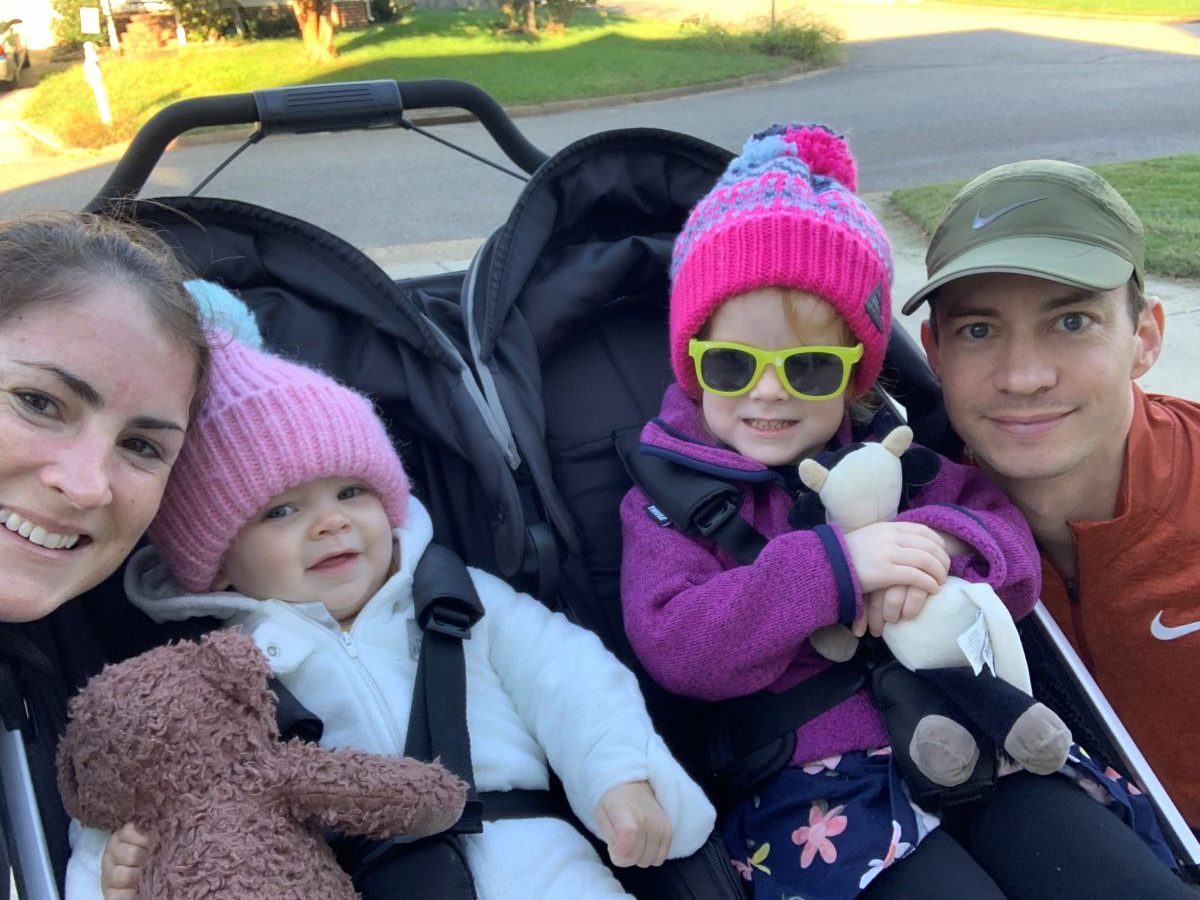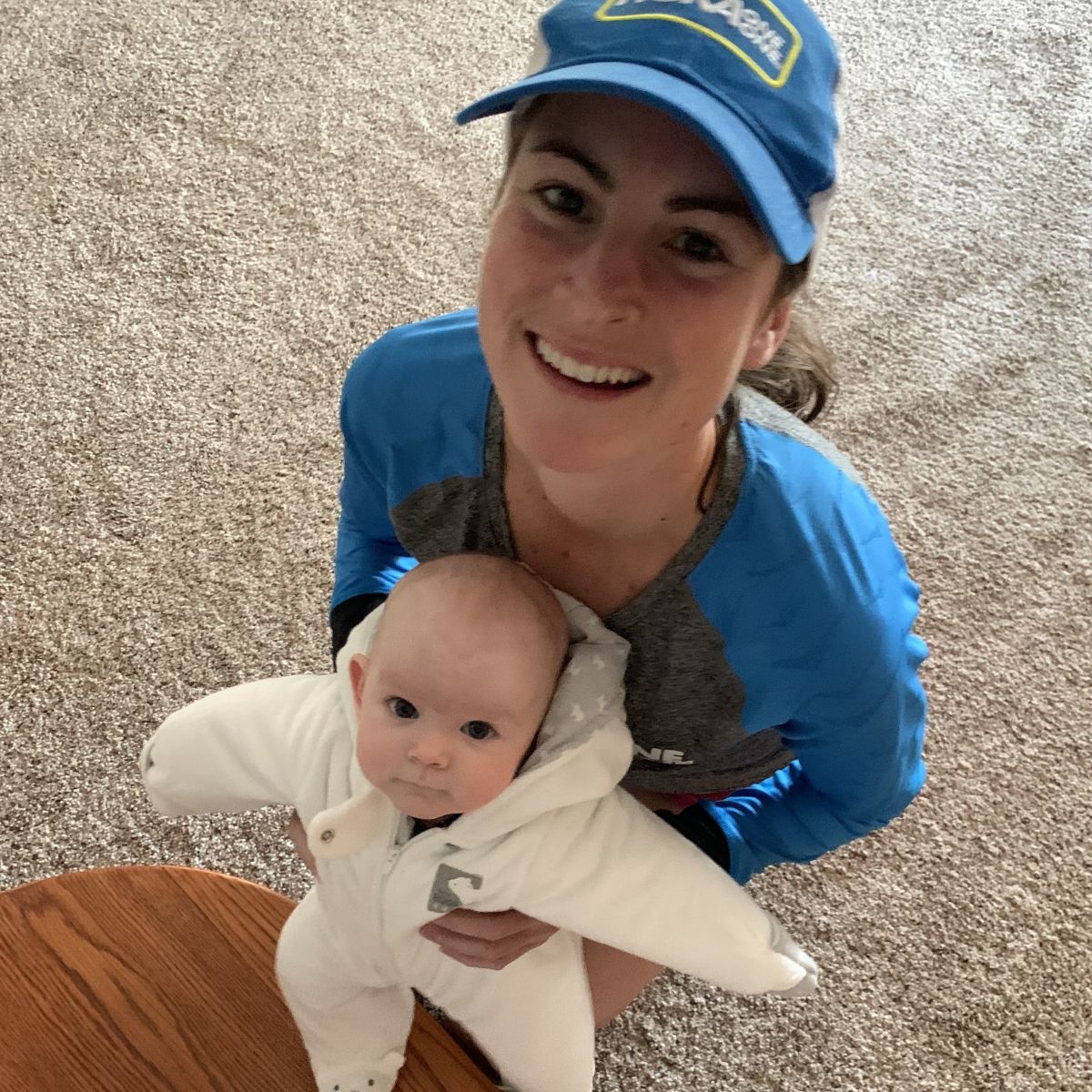There is a game I often play. I put my sleeping baby in his bassinet. Then I start running on the treadmill. I have no idea how long my run will be. My baby will wake up at some point between two minutes and two hours.
Trying to select a sustainable pace for a run of unknown length is a challenge. Sometimes I start my runs too aggressively, and then my son sleeps for two hours. Other times I run at a moderate pace, and he wakes up almost immediately. Some days, I start to grow weary, and I have no idea how much longer I will run. Those days are edifying. The mystery is what makes this game fun.
My Third Comeback
When I started writing this column years ago, I was a professional runner and graduate student with zero children. Now I am an assistant professor, a casual runner (who is not casual about anything), and a mom of three kids — a five-year-old, a two-year-old, and a 10-week-old baby.
Having a baby means I am psychologically, physically, and logistically tethered to a tiny person all day long. Having a two-year-old and five-year-old means I spend my free time adjudicating ownership disputes about dolls.
Before children, it was easy to get my mileage in — much easier than it is for me now. These days, my life is optimized for toddlers, not for running. Even so, running remains a priority for me, both because I enjoy the activity in itself and because I aim to return to racing eventually.
In case this helps anyone else in this crazy (and wonderful) season of life, here are my best strategies for navigating training with small children. Parenting aside, most of this advice applies to busy seasons of life in general.

The author out for a run with her daughters, Frances (left) and Lucy, and husband David. All photos courtesy of Sabrina Little.
Consider Prepositional Training
I used to think it was not worth my time to head out for a run if I had fewer than 90 minutes to be outdoors. Now that sentiment is wild to me. This past year, there were days when I headed outside to run for 10 to 12 minutes. This is a paltry sum; I know that. However, it is better than zero minutes, and it is worth it for maintaining habits and building consistency. Later in the day, I might find a second window of time for additional running. All of these little run crumbs add up to something by the end of the week.
These days, I use the term “prepositional running” to describe my training. I run before things, between things, and after things. I fit training around my substantial obligations — family, teaching, and writing. Stated differently, if my life were a living room, running would occupy the crevasses between the couches. Running is a preposition, not a noun.
Running still matters to me a great deal. But being flexible about where running fits in during the day makes it more sustainable in a busy life.
Feel Bad? Have a Snack
This is one I learned from ultrarunning: If you are tired, have a snack. If you feel bad, have a snack. If you think everything is impossible, have a snack.
Snacks don’t solve everything, but they don’t usually make things worse. So, when life is busy and morale is low (my own or my children’s), I always reach for a snack.
Remember the Season You Are In
Returning to running postpartum is like venturing onto thin ice. At first, you take small steps, bracing yourself and testing the integrity of the situation. You take all reasonable precautions. But then, as you proceed, you become more confident and less tentative. This is when things become dangerous — when you forget you are on thin ice.
There are lots of physical imbalances that result from having a child. Because of these imbalances, I am generally cautious in my return to running — until a certain point. Then I fall into a routine of normalcy. I desist ancillary work like core training, stop supplementing calcium, and forget to account for the fact that I am the fuel source for a growing baby. This is when I become injured — when I forget that I am still compromised.
My advice is to be patient in the postpartum phase. I am trying to do that this time. Remember that it is just a season — not forever — and that it is a special season of life. Coming out the other side with a base of whatever-miles-you-can-manage will be much more productive than pressing things and coming away injured.
Communicate Your Plan
As I start building back to form, it helps to know which runs matter. Most of my training is flexible, but I try to include one or two key sessions per week — a long(ish) run and a speed day. When I have these key runs on the agenda, I always communicate my plan to my husband.
This is for two reasons: First, saying it out loud holds me accountable to actually complete these runs. Otherwise, it can be easy to punt workouts to another day or explain away their value. Second, I am not the only person in my house who has daily objectives to meet. Maybe my husband has a meeting, or we have an obligation I have forgotten about. Maybe pushing the long run to a different day would fit better in the scope of family life. Articulating a plan aloud means no one’s plans are suddenly thwarted.
Honor the Other People in Your Life
There is a memorable line in C.S. Lewis’s “The Four Loves.” He is writing about how love makes us vulnerable, and this is a good thing. He writes, “If you want to make sure of keeping [your heart] intact you must give it to no one, not even an animal. Wrap it carefully round with hobbies and little luxuries; avoid all entanglements. Lock it up safe in the casket or coffin of your selfishness. But in that casket, safe, dark, motionless, airless, it will change. It will not be broken; it will become unbreakable, impenetrable, irredeemable. To love is to be vulnerable (1).”
I often think about this idea — that I could cocoon myself with my hobbies and live a life fully structured in terms of my own objectives. I could protect my hobbies at all costs. Alternatively, I could make my life about other people — a more vulnerable way of being positioned in the world. I could invest in other people and pursue their good. Sure, it might undermine my running in performance-relevant terms. However, deprioritizing my objectives for the sake of honoring other people (even, or especially, my children) is never going to be the wrong answer.
Final Thoughts
These days, I keep writing about how to make running smaller, mostly because that is the phase of life I am in. This does not mean forgetting I exist or ignoring my vocations. Clearly, I still train like I have goals. I run a great deal. But children don’t stay small for long, and every time I make space in my life for other people, my own life feels a lot richer.
Call for Comments
How do you manage to fit running around parenting or other busy seasons in life?
Notes/References
C.S. Lewis. 1991. “The Four Loves.” Harcourt, 121.

